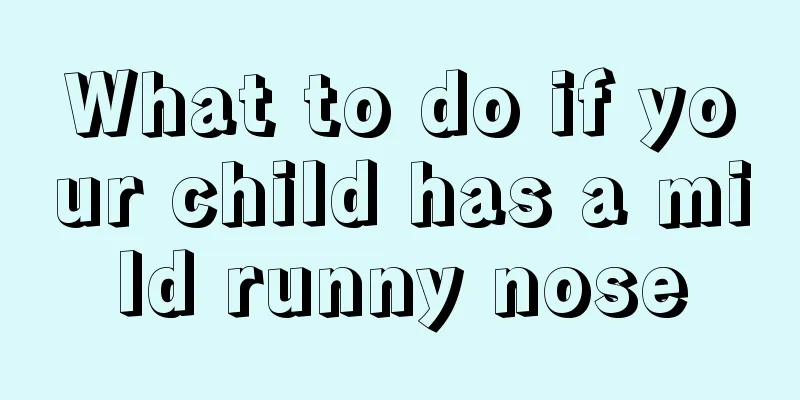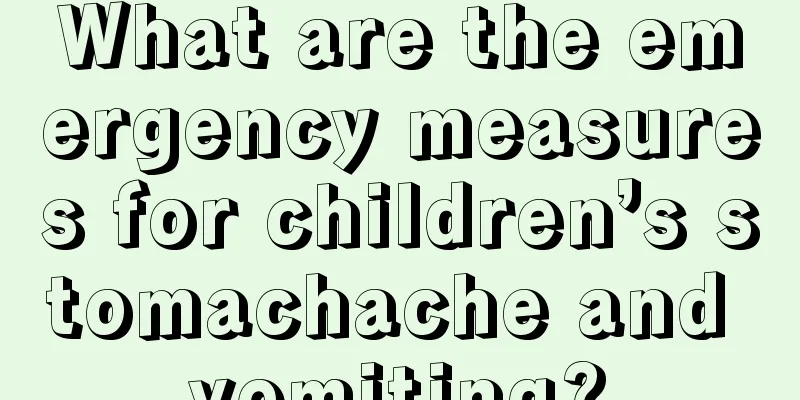What to do if your child has a mild runny nose

|
Runny nose is a very common phenomenon in children. It may be because the child has a cold or rhinitis. Therefore, if you want to completely relieve your child's runny nose symptoms, you need to first determine whether the child has a cold or rhinitis, and then treat it through methods such as nasal aspirator, hot compress, facial steaming, etc. Below, we will introduce to you the causes and treatment methods of mild runny nose in children.
First, use a nasal aspirator Use a nasal aspirator to suck out the secretions in the child's nasal cavity. When using it, parents should also press the other nostril while sucking, which will have a better effect. In addition, before using the nasal aspirator, make sure the machine is clean and tidy to prevent the child's nasal cavity from being infected. Second, hot compress nose If the child's nasal mucus is thick and causes difficulty breathing, parents can also use hot compresses on the nose to relieve the child's symptoms. When a hot towel is applied to a child's nose, the heat will cause the thick mucus in the nasal cavity to turn into watery mucus and flow out.
If you have a facial steamer at home, you can use it to steam your child’s face. When the nasal cavity is moistened, it will be easier to discharge mucus. If you don’t have a facial steamer, you can simply use a small basin, fill it with hot water, and let your child put his face close to the basin to steam. 2. Is a runny nose in a child a cold? In addition to colds, children's runny noses may also be caused by other reasons, such as rhinitis. When parents see their child has a runny nose, if they do not find that the child has symptoms such as fever or cold, they can consider it as rhinitis. Rhinitis refers to inflammation of the nasal mucosa and submucosal tissue, which leads to the production of mucus inside the nasal cavity. In addition to the symptom of runny nose, rhinitis may also be accompanied by nasal congestion, purulent nasal discharge, decreased sense of smell, headache, dizziness, loss of appetite, and fatigue. If parents find that their children often have a runny nose and also have the above symptoms, they should immediately take the child to the hospital for examination to see if the child really has rhinitis to avoid delaying treatment. If it is determined after examination that the child's runny nose is not caused by rhinitis, you can treat it with the usual methods to relieve the child's runny nose, such as facial steaming, nasal aspirator, hot compress wallpaper, etc.
1. Clear water-like nasal discharge: This situation often occurs in the early stages of a cold. Due to congestion and swelling of the nasal mucosa, more clear water-like nasal discharge is produced in the nasal cavity. 2. Purulent nasal discharge: Rhinitis is more serious and is more common in sinusitis. 3. Nasal discharge with pus: 3-5 days after a cold, the nasal congestion is more serious and the secretions gradually turn into purulent ones. 4. Bloody nasal discharge: If there are blood clots or blood streaks in the nasal discharge, it may be caused by nasal trauma, rhinitis, foreign objects in the nasal cavity, or a lack of vitamin C or vitamin K in the body. 5. Clear nasal discharge but sneezing: This situation may be caused by allergic rhinitis in children, which is more common after getting up in the morning. |
<<: How to exercise the penis at the age of thirteen
>>: Treatment for eczema in children
Recommend
Hard pimples on baby's body
During the growth and development stage, babies w...
What are the symptoms of capillary hemangioma in children?
The incidence of hemangioma is increasing, especi...
What to do if your child has no patience
The pace of social life and work is now relativel...
What should I do if my child has crossbite?
Oral care is a part of children's family heal...
Does precocious puberty mean that you won't grow taller?
It is very important for parents that children ca...
What can children use to wash their faces to make them whiter?
Parents all hope that their children have fair an...
Is it okay for a baby to sleep on his side?
For many little babies, parents are very concerne...
Can children with hand, foot and mouth disease drink milk?
Hand, foot and mouth disease is very easy to occu...
Children's recipes and methods
Children of different ages actually need differen...
What kind of milk powder should I choose for my nine-month-old baby?
Many women have had the experience of choosing ba...
What causes effusion?
Hydrocephalus is a common disease in children. It...
How to treat encephalitis in children
Encephalitis is a very serious disease. Many chil...
How to treat severe pneumonia in children?
If some young children suffer from pneumonia, it ...
What to do if your child has anal fissure bleeding
Children love to move around and want to run outs...
What are the developmental indicators of a baby at ten months?
After pregnancy, every mother hopes that the fetu...









